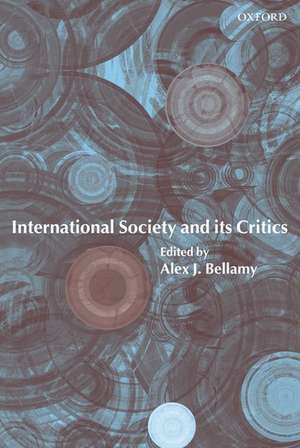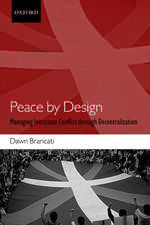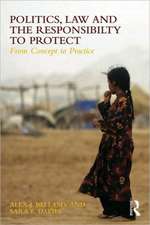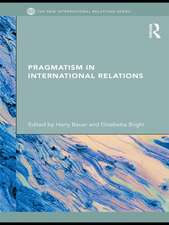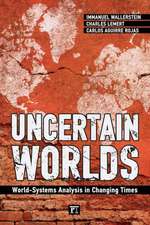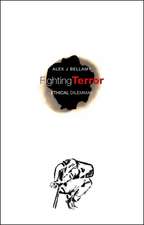International Society and its Critics
Editat de Alex J. Bellamyen Limba Engleză Paperback – 9 dec 2004
many types of actor and be able to explain the different types of issue in world politics. This International Society approach offers one of the most illuminating ways of understanding the major issues of our day, such as terrorism, global governance, and the role of international law.
| Toate formatele și edițiile | Preț | Express |
|---|---|---|
| Paperback (1) | 336.71 lei 31-37 zile | |
| OUP OXFORD – 9 dec 2004 | 336.71 lei 31-37 zile | |
| Hardback (1) | 1039.62 lei 31-37 zile | |
| OUP OXFORD – 8 dec 2004 | 1039.62 lei 31-37 zile |
Preț: 336.71 lei
Preț vechi: 456.04 lei
-26% Nou
Puncte Express: 505
Preț estimativ în valută:
64.44€ • 67.03$ • 53.20£
64.44€ • 67.03$ • 53.20£
Carte tipărită la comandă
Livrare economică 03-09 aprilie
Preluare comenzi: 021 569.72.76
Specificații
ISBN-13: 9780199265206
ISBN-10: 0199265208
Pagini: 340
Dimensiuni: 158 x 235 x 20 mm
Greutate: 0.94 kg
Editura: OUP OXFORD
Colecția OUP Oxford
Locul publicării:Oxford, United Kingdom
ISBN-10: 0199265208
Pagini: 340
Dimensiuni: 158 x 235 x 20 mm
Greutate: 0.94 kg
Editura: OUP OXFORD
Colecția OUP Oxford
Locul publicării:Oxford, United Kingdom
Descriere
Descriere de la o altă ediție sau format:
In recent years, the English School or international society approach to International Relations has risen to prominence because its theories and concepts seem able to help us explain some of the most complex and seemingly paradoxical features of contemporary world politics. In doing so, the approach has attracted a variety of criticisms from both ends of the political spectrum. Some argue that the claim that states form an international society is premature in an era of terror where power politics and the use of force have returned to the fore. Others insist that international society's state-centrism make it an inherently conservative approach unable to address many of the world's most pressing problems. International Society and its Critics provides the first in-depth study of the English School approach to International Relations from a variety of different theoretical and practical perspectives. Sixteen leading scholars from three continents critically evaluate the School's contribution to the study of international theory and history; consider its relationship with a variety of alternative perspectives including international political economy, feminism, environmentalism, and critical security studies; and assess how the approach can help us to make sense of the big issues of the day such as terrorism, the management of cultural difference, global governance, the ethics of coercion, and the role of international law. They find that whilst the concept of international society helps to shed light on many of the important tensions in world politics, much work still needs to be done. In particular, the approach needs to broaden its empirical scope to incorporate more of the issues and actors that shape global politics; draw upon other theoretical traditions to improve its explanations of change in world politics; and recognize the complex and multi-layered nature of the contemporary world.
In recent years, the English School or international society approach to International Relations has risen to prominence because its theories and concepts seem able to help us explain some of the most complex and seemingly paradoxical features of contemporary world politics. In doing so, the approach has attracted a variety of criticisms from both ends of the political spectrum. Some argue that the claim that states form an international society is premature in an era of terror where power politics and the use of force have returned to the fore. Others insist that international society's state-centrism make it an inherently conservative approach unable to address many of the world's most pressing problems. International Society and its Critics provides the first in-depth study of the English School approach to International Relations from a variety of different theoretical and practical perspectives. Sixteen leading scholars from three continents critically evaluate the School's contribution to the study of international theory and history; consider its relationship with a variety of alternative perspectives including international political economy, feminism, environmentalism, and critical security studies; and assess how the approach can help us to make sense of the big issues of the day such as terrorism, the management of cultural difference, global governance, the ethics of coercion, and the role of international law. They find that whilst the concept of international society helps to shed light on many of the important tensions in world politics, much work still needs to be done. In particular, the approach needs to broaden its empirical scope to incorporate more of the issues and actors that shape global politics; draw upon other theoretical traditions to improve its explanations of change in world politics; and recognize the complex and multi-layered nature of the contemporary world.
